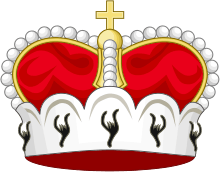Ratu
| Nobility of Fiji |
|---|
| Titles |
| Institutions |
| Confederacies |
| Rotuman Traditional Leadership |
Ratu is a title used by Fijians of chiefly rank. An equivalent title, Adi (pronounced [ˈandʒi]), is used by females of chiefly rank. In the Malay language, the title Ratu is also the traditional honorific title to refer to the ruler (king or queen) in Javanese culture. Thus in Java, a royal palace is called "keraton", constructed from the circumfix ke- -an and Ratu, to describe the residence of the Ratu.
Etymology
Ra is a prefix in many titles (Ramasi, Ramalo, Rasau, Ravunisa, Ratu), and Tu means simply "chief". The formal use of "Ratu" as a title in a name (as in "Sir" in British tradition) was not introduced until after the cession of 1874. Until then, a chief would be known only by his birth name and his area-specific traditional title.
Regional variations include Ro in Rewa and parts of Naitasiri and [b[Tailevu Province|Tailevu]]. Roko in parts of Naitasiri, Rewa and Lau (particularly the Moala group), Ra in parts of Vanua Levu, particularly the province of Bua.
In all those places, it is used as a title preceding the person's name, much like "Prince", "Duke", "Earl", "Baron" or "Lord".
The semantics, however, are a little different in Fijian although the name and title are usually reversed, for example:
In English, one would say His Royal Highness (Styling) Prince (address/title) Andrew (name), Duke of York (noble title).
One Fijian, one would say, Gone Turgaga Na (Styling) Roko Tui Bau (noble title), Ratu (address/title) Joni Madraiwiwi (name).
Fijian nobility
The Fijian nobility consists of about seventy chiefs, each of whom descends from a family that has traditionally ruled a certain area. The chiefs are of differing rank, with some chiefs traditionally subordinate to other chiefs. The Vusaratu clan is regarded as the highest chiefly clan, with regards to the people of Bau until the rise of the Tui Kaba clan leader, who exiled all vusaratu members. They are the heirs of Seru Epenisa Cakobau, the Vunivalu of Bau or Tui Levuka (Paramount Chief of Bau, on the eastern side of Viti Levu, Fiji's most populous island), who was the first chief to unite the entire country under his authority in 1871, when he was proclaimed Tui Viti (King of Fiji). He subsequently ceded the islands to the United Kingdom in 1874.
Other prominent chiefly clans include the Vuanirewa (the traditional rulers of the Lau Islands) and the Ai Sokula (the traditional rulers of Vanua Levu).
During the colonial rule (1874–1970), the British kept Fiji's traditional chiefly structure and worked through it. They established what was to become the Great Council of Chiefs, originally an advisory body, but it grew into a powerful constitutional institution. Constitutionally, it functions as an electoral college to choose Fiji's president (a largely honorary position modelled on the British monarchy), the vice-president, and 14 of the 32 senators, members of Parliament's "upper house", which has a veto over most legislation. The 18 other senators are appointed by the Prime Minister (9), the Leader of the Opposition (8), and the Council of Rotuma (1); these appointees may, or may not, be of chiefly rank also. (The Senate was modelled on Britain's House of Lords, which consists of both hereditary and life peers.)
The presidency, vice-presidency, and fourteen senators are the only constitutional offices whose appointment is controlled by persons of chiefly rank. Chiefs in post-independence Fiji have always competed for parliamentary seats on an equal footing with commoners. In the years following independence, this favoured the chiefly class, as the common people looked to them as their leaders and generally voted for them. For several elections, many ethnic Fijian members of the House, which is elected by universal suffrage, were of chiefly rank, but in recent elections, the discrepancy between chiefs and commoners is slowly narrowing, as commoners are becoming better educated and have begun to work their way into the power structure. The chiefs, however, retain enormous respect among the Fijian people. In times of crisis, such as the coups of 1987 and the third coup of 2000, the Great Council of Chiefs often stepped in to provide leadership when the modern political institutions have broken down. Although the distinction between chiefs and commoners will inevitably continue to lessen, the chiefly institutions are unlikely to disappear any time soon.
Notable chiefs
- Ratu Sir George Cakobau; Fiji's first native-born Governor General
- Ratu Seru Epenisa Cakobau; Fijian Monarch who ceded the islands to the United Kingdom
- Ratu Sir Penaia Ganilau; Fiji's first President of Fiji
- Ratu Josefa Iloilo; former President
- Ratu Sir Kamisese Mara; Founding father; longest running Prime Minister and President
- Ratu Tevita Momoedonu; former Prime Minister
- Ratu Sir Lala Sukuna; Soldier, scholar, and statesman. First Fijian university graduate. Read Law at Oxford. Former Speaker of the Legislative Council
- Ratu Epeli Nailatikau; former Speaker of the Senate and current President
- Ratu Joni Madraiwiwi; former Vice-President, former High Court Judge and prominent lawyer.
- Ratu J.A.R. Dovi; first fully qualified medical doctor.
References
- Lau Islands, Fiji, By Arthur Maurice Hocart, Published 1929, Bernice P. Bishop Museum, Ethnology, 241 pages, Original from the University of Michigan, no.62 1929, Digitized Feb 23, 2007. Page 150 has details on titles like Ratu and Roko and their use
